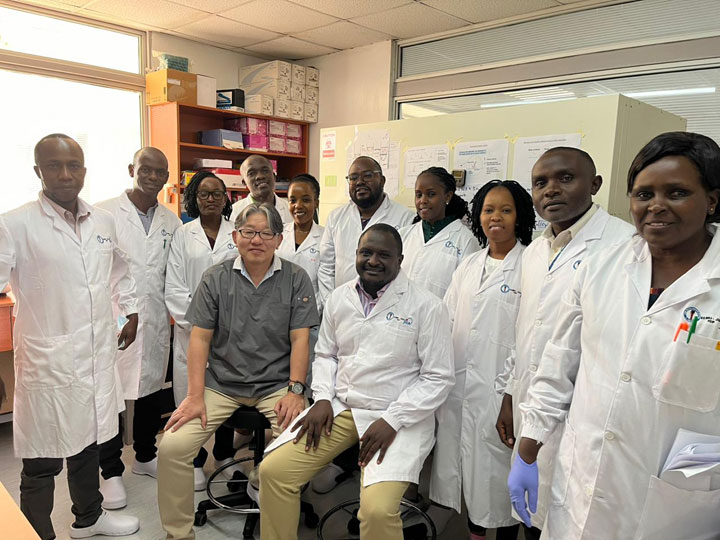これまでにリサーチャー(研究者)向け内部研修を5回実施しました
「成果 2:KEMRI において研究者の高度研究開発及びイノベーション能力が強化される。」の達成に向けて、2023年度から2024年度にかけて計5回の研究者向け研修(TICT for Reserchers)を実施しました。
TICTI第1回、第2回、第4回の研修内容はKEMRI内のLMS (Learning Management System)のコンテンツとしても活用されています。
TICT for Researchers
1. Cell culture (19th-23rd Jun., 2023)
by Prof. Shigo Inoue,
Nagasaki University Institute of Tropical Medicine and Kenya Medical Research Institute (NUITM-KEMRI)
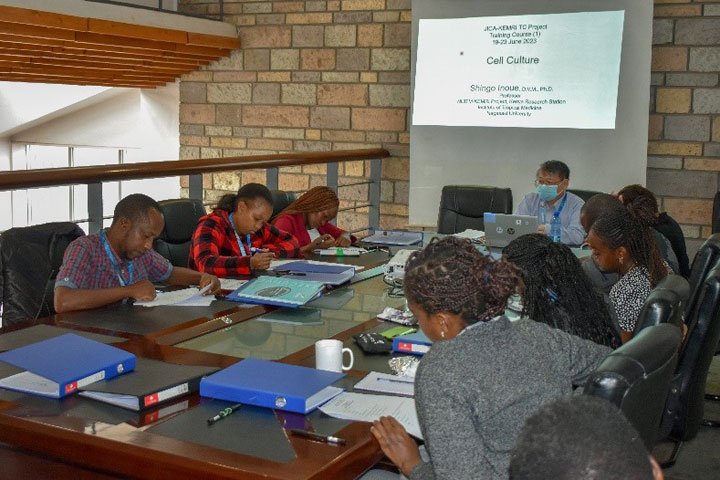
The overall learning objectives of the TCIT (TCP in-country training) 1:
To build the technical capacity so as to enable to conduct cellular experiments related to and to enable to carry out advanced experiments and mentor younger colleagues.
This training aimed to provide participants with additional knowledge, techniques and overall hands-on skills so as to enhance their fundamental understanding and practical skills necessary for daily cell culture work. The training covered a range of topics on cell culture such as troubleshooting for contamination, cell storage and revival of cells, transportation, myeloma cell preparation for Hybridoma cell (mono clonal antibody development) as well as purification and conjugation of mono clonal and poly clonal antibodies.
2. Virus isolation (31stJul.-11thAug., 2023)
by Prof. Inoue.
The overall learning objectives of the TCIT2:
To impart knowledge and build their technical capacity in virus isolation contributing to their overall capacity enhancement in the field of OMICS. The training covered a range of topics, including;
- Merits and risks of virus isolation
- Routes of administration to laboratory animals
- Routes of administration to embryonated eggs
- Cytopathic Effects (CPE)
- CPE Observation
- Classification of viruses
- Virus titration (Plaque Assay, Focus Assay)
- Infection cycle of viruses
- Diagnosis of viral diseases
- Calculation (PFU/mL, M.O.I, FFU/mL)
- Virus detection methods
- Virus isolation
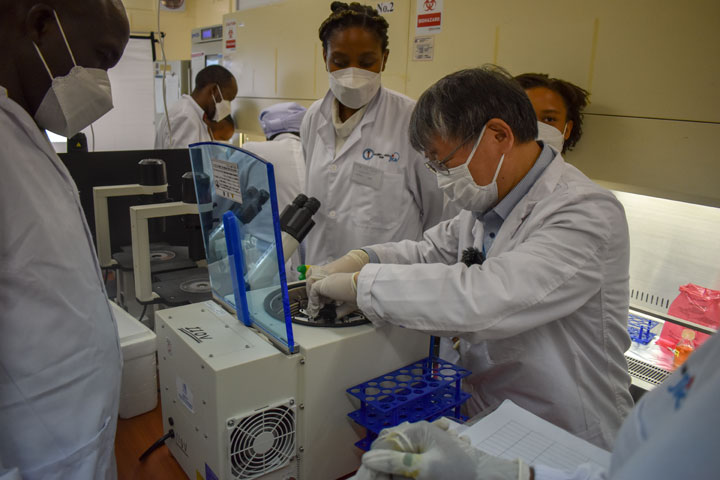
3. Expression and purification of recombinant protein in E. coli (21st-30th Aug., 2023)
by Prof. Yoshito Fujii,
Sanyo Women's College, Department of Clinical Laboratory Sciences
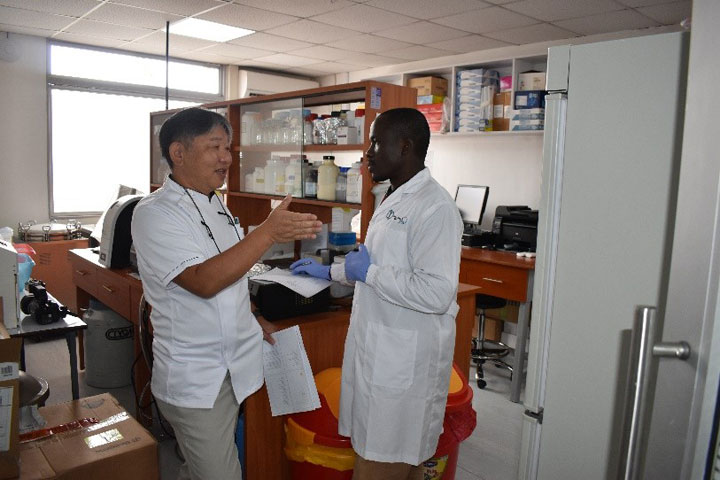
The overall learning objectives of the TCIT3:
To equip participants with knowledge and skills in protein expression systems and their significance in scientific research. Through a structured training plan, the participants would be expected to gain in-depth knowledge and practical skills essential for working with proteins and protein expression.
This was aimed at empowering the TCP participants to confidently navigate working with proteins. Additionally, participants are encouraged to grasp the validation for selecting the most suitable protein expression system based on specific research objectives.
4. Serological examinations (ELISA) (23rd-27thOct., 2023)
by Prof. Inoue
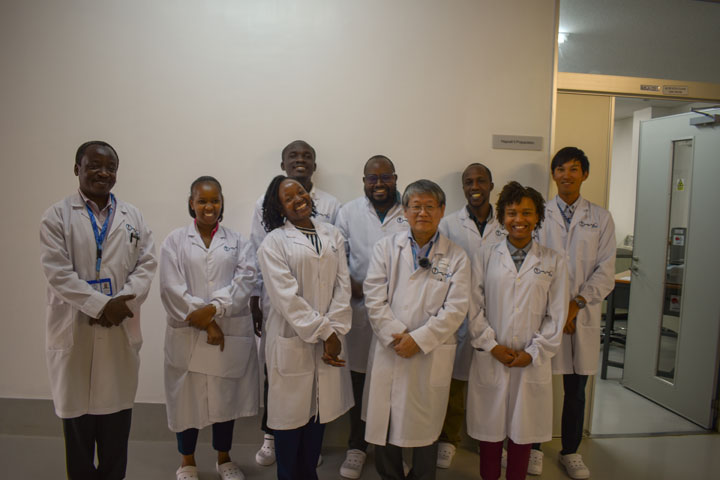
The overall learning objectives of the TCIT4:
To build and enhance the knowledge on serological diagnosis, specifically focusing on arboviruses. To build the capacity of KEMRI researchers, enabling them to utilize these skills to enhance their day-to-day activities or work. Additionally, the participants were encouraged to disseminate their newly acquired knowledge to their peers, ensuring the sustainability and lasting impact of the ongoing TCT project. The training encompassed various topics, one of which involved improving professional communication.
- 1 . Virus detection vs serology
- 2 . Diagnosis of viral diseases
- 3 . Flowchart for diagnosis of arbovirus infection
- 4 . Table of Serological tests
- 5 . IgM-capture ELISA
- 6 . How to choose negative controls for IgM-capture ELISA
- 7 . IgG indirect ELISA
- 8 . IgM ELISA vs IgG ELISA
- 9 . Neutralization test (PRNT50, FRNT50)
- 10 . Table of Virus detection tests
- 11 . ELISA vs Neutralization test
- 12 . Antigen detection ELISA
- 13 . ELISA protocols (Antigen, IgM)
5. Subcloning (11th-22nd Mar., 2024)
by Prof. Fujii
The overall learning objectives of the TCIT5:
To encompass a holistic approach to molecular biology techniques, with a primary focus on mastering the subcloning procedure for DNA manipulation.
Participants would be exposed to both theoretical foundations and practical applications, aiming to cultivate a comprehensive understanding of the subcloning process. Through hands-on laboratory sessions, the participants were expected to gain essential skills in releasing and purifying DNA inserts, ligating them into destination vectors, and transforming resultant constructs into competent bacterial cells. A pivotal aspect of the training involved the analysis of restriction enzyme (RE) sites within the multiple cloning sites (MCS) of parent and destination vectors, as well as within DNA inserts, to devise effective subcloning strategies. Quality control measures, including screening transformed cells to verify inserted DNA, would be emphasized to ensure the success of subcloning experiments.
Furthermore, the training sought to foster collaboration among participants of varying career stages, facilitating knowledge exchange and peer learning. Ultimately, the goal was to empower junior and mid-level researchers to cascade acquired skills and knowledge within their research teams, respective domicile departments and KEMRI as a whole, enabling them to contribute effectively to advancements in molecular biology research and the overall sustainability of the KEMRI-JICA Research Capacity Building project.
